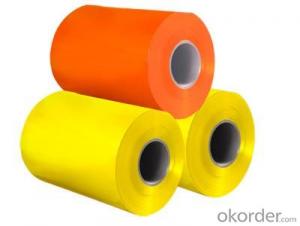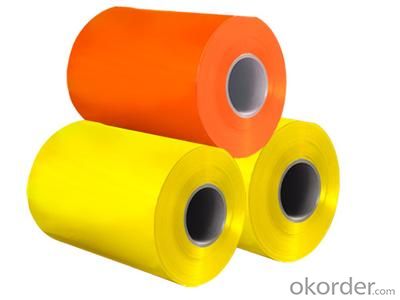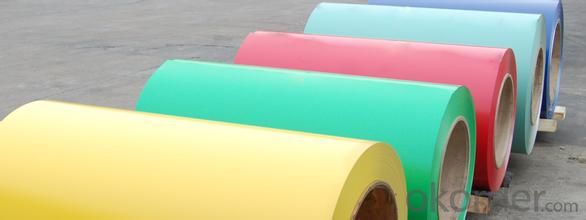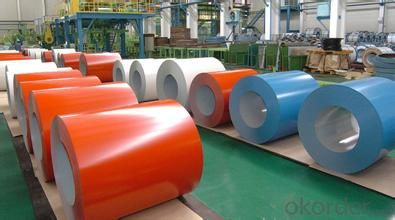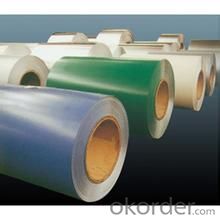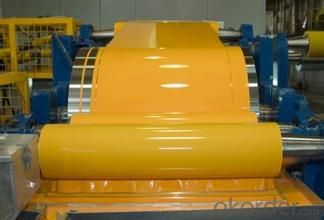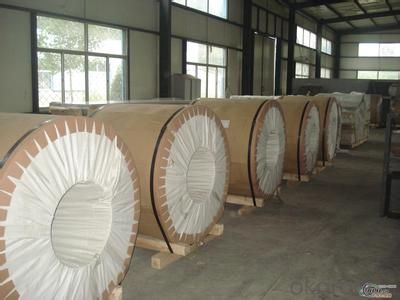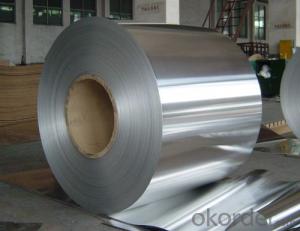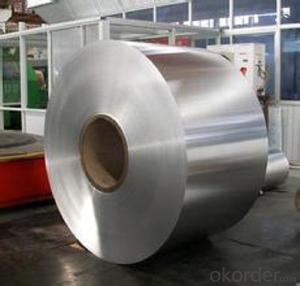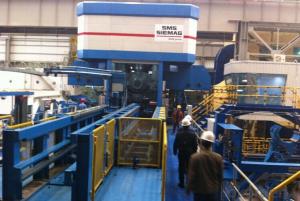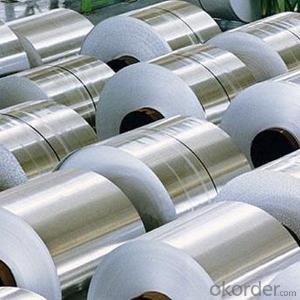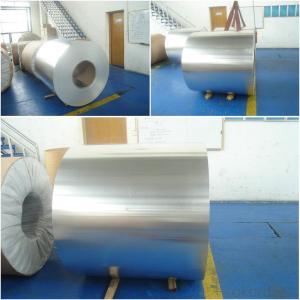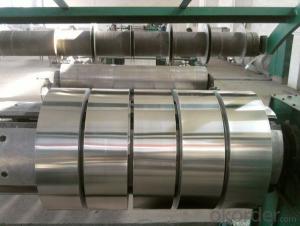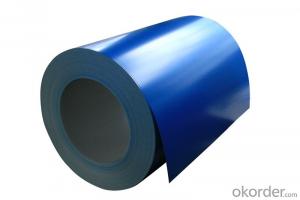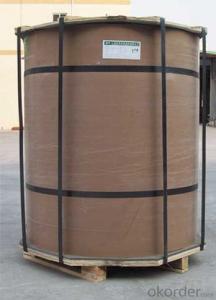Vinyl Coated Aluminum Coil Stock - Aluminum Roll Coil for Export to America
- Loading Port:
- China Main Port
- Payment Terms:
- TT OR LC
- Min Order Qty:
- -
- Supply Capability:
- -
OKorder Service Pledge
OKorder Financial Service
You Might Also Like
Aluminium is a relatively soft,durable, lightweight, ductile and malleablemetalwith appearance ranging from silvery to dull gray, depending on the surfaceroughness. It is nonmagnetic and does not easily ignite. A fresh film ofaluminium serves as a good reflector (approximately 92%) of visible light and an excellent reflector (asmuch as 98%) of medium and far infrared radiation. The yield strengthof pure aluminium is 7–11 MPa, while aluminium alloys have yield strengths ranging from200 MPa to 600 MPa. Aluminium has about one-third the density and stiffness of steel.It is easily machined, cast, drawn and extruded.
Aluminium alloys (or aluminum alloys; see spellingdifferences) are alloysin which aluminium(Al) is the predominant metal. The typical alloying elements are copper, magnesium,manganese,silicon,tin and zinc. There are twoprincipal classifications, namely casting alloys and wrought alloys, both of which are furthersubdivided into the categories heat-treatableand non-heat-treatable. About 85% of aluminium is used for wrought products,for example rolled plate, foils and extrusions.Cast aluminium alloys yield cost-effective products due to the low meltingpoint, although they generally have lower tensile strengthsthan wrought alloys. The most important cast aluminium alloy system is Al–Si,where the high levels of silicon (4.0–13%) contribute to give good castingcharacteristics. Aluminium alloys are widely used in engineering structures andcomponents where light weight or corrosion resistance is required
Alloy: AA1050, 1060, 1100, AA3003, 3005, 3015, 5052, 5754, 5083,8011,etc
Temper:H14/16/18/22/24/32,HO etc.
Thickness:0.2mm—100mm
Width:100mm—2300mm (Can be slitted)
InnerDiameter: 508MM
CoilWeight:500kg-3000kg(Max.)
Application: Foil stock, Circles, Roofing, Canstock, Marine plate,Anti-sliperypurpose in vehicles, packing and appliance.
Features:
1. Excellent quality of products
2. Quick delivery
3. Best service to clients
4. BV,SGS avalible
5. No buckle o waveness
6. Tension leveling
7. Certificate of Origin
8. Form A,E
Packaging Detail: Carton ,Wooden pallet with plastic protection packing,standard seaworthy packing or as your request.
ProductionCapacity:
AnnualProduction capacity of 600,000 tons.
Products areexported to United States, Canada, U.A.E, Brazil, Mexico,Thailand, Vietnam,Nigeria etc, over 100 countries andregions all over the world.
Coveredfactories with full production line
CNBM aluminumproduction base is comprised of 18 aluminumannealers, 10 coil and foilmills, 4 continuous production lines, 2hot rolling production line and 3prepainted lines.
FAQ:
1. What is the form of payment?
Normally 30% TT, L/C
2. Type of quotation?
FOB, CFR, CIF
3. Port of loading?
Shanghai port
4. Delivery time?
30 day after client’s deposit
- Q: What unique considerations or precautions need to be taken when handling aluminum coils?
- <p>When handling aluminum coils, there are several special requirements to consider. First, it's crucial to handle the coils carefully to avoid denting or scratching the surface, which can affect their quality and value. Secondly, due to aluminum's lightweight and high strength, specialized equipment like slitters and rewinders may be necessary to process the coils. Additionally, it's important to store aluminum coils in a dry environment to prevent corrosion. Proper ventilation is also required to avoid condensation, which can lead to oxidation. Finally, safety measures such as wearing protective gear and following material handling guidelines are essential to prevent accidents and injuries.</p>
- Q: Can aluminum coils be used for heat transfer applications?
- Indeed, heat transfer applications can utilize aluminum coils. The commendable thermal conductivity of aluminum renders it remarkably efficient in transferring heat. In multiple heat transfer applications like air conditioning systems, refrigeration units, and heat exchangers, aluminum coils are frequently employed. The lightweight nature of aluminum, coupled with its resistance to corrosion, further contributes to its widespread preference in these applications. Moreover, the malleability of aluminum coils allows for the facile shaping and forming, thereby facilitating efficient heat transfer even in intricate systems.
- Q: How are aluminum coils used in the production of medical equipment?
- The unique properties and versatility of aluminum coils make them widely used in the production of medical equipment. In the medical industry, aluminum coils are primarily utilized in manufacturing various medical devices including MRI machines, X-ray machines, and ultrasound equipment. The excellent conductivity of aluminum coils is the main reason for their utilization in medical equipment production. This property enables them to effectively conduct and dissipate heat, which is crucial for the proper functioning of medical devices. For example, MRI machines generate a significant amount of heat during operation, and aluminum coils help regulate and maintain the desired temperature for optimal performance and patient safety. Furthermore, the high malleability of aluminum coils allows them to be easily formed into different shapes and sizes. This makes them ideal for producing medical equipment with intricate designs and precise specifications. For instance, aluminum coils are used in constructing radiation shields, which protect medical personnel and patients from harmful radiation emitted by X-ray machines. Additionally, aluminum coils are lightweight yet durable, making them an excellent choice for portable or easily maneuverable medical equipment. This is particularly important for devices like portable ultrasound machines, where lightweight components are necessary for ease of use and transportation. Moreover, aluminum coils exhibit excellent corrosion resistance, a vital characteristic in the medical field where cleanliness and hygiene are of utmost importance. The resistance to corrosion prevents the accumulation of bacteria, germs, and other contaminants on the surface of medical equipment, ensuring a safe and sterile environment for patients and healthcare professionals. In conclusion, aluminum coils play a crucial role in the production of medical equipment, offering properties such as conductivity, malleability, lightweight, durability, and corrosion resistance. These properties enable the efficient and safe operation of medical devices, contributing to improved patient care and well-being.
- Q: How are aluminum coils protected against UV exposure during storage?
- Aluminum coils are typically protected against UV exposure during storage through the application of a protective coating or the use of UV-resistant packaging materials. Aluminum coils are highly susceptible to UV degradation, which can result in discoloration, surface damage, and reduced performance. Therefore, manufacturers and distributors take special precautions to ensure that the coils are shielded from harmful UV rays. One common method is the application of a protective coating on the surface of the coils. This coating acts as a barrier between the aluminum material and UV radiation, preventing direct exposure. The coating is typically a specialized paint or lacquer that contains UV inhibitors, which absorb or reflect UV rays, thereby minimizing damage to the coils. This protective layer also helps to preserve the aesthetic appearance of the coils and extend their lifespan. In addition to coatings, aluminum coils can also be stored in UV-resistant packaging materials. These materials are designed to block or absorb UV radiation, effectively creating a shield around the coils. Common UV-resistant packaging materials include polyethylene films, which are specifically formulated to provide excellent UV protection. By storing the coils in such packaging, they are safeguarded against direct sunlight and other sources of UV radiation. It is worth noting that UV protection measures are particularly crucial during long-term storage or transportation, as the coils may be exposed to UV rays for extended periods. By implementing these protective measures, manufacturers and distributors ensure that the aluminum coils maintain their quality and performance, even when stored in environments with high UV exposure.
- Q: This question asks for a method to compact an aluminum coil by folding it.
- <p>To fold an aluminum coil for compactness, first ensure the coil is free of sharp edges or damage. Use gloves for safety. Start by laying the coil flat. Measure and mark the desired folded length. Begin folding the coil by bringing one end towards the center, aligning the edges neatly. Continue folding back and forth, ensuring each fold is tight and even. Use a rubber mallet or similar tool to secure the folds, if necessary. For larger coils, consider using a mechanical folder or press to apply even pressure. Always work in a well-ventilated area and follow safety guidelines to prevent injury.</p>
- Q: This question seeks to understand the various types of aluminum coils that are commonly found in the market.
- <p>Aluminum coils available on the market today can be categorized based on their properties and applications. These include: 1. Plain Aluminum Coils: Used for general purposes like packaging and construction. 2. Embossed Aluminum Coils: Feature a textured surface, used in decorative applications. 3. Alloy Aluminum Coils: Made from a mixture of aluminum and other metals for enhanced strength or corrosion resistance. 4. Color Coated Aluminum Coils: Coated with paint or plastic for aesthetic or protective purposes. 5. Heat Treated Aluminum Coils: Processed to improve their mechanical properties. 6. Mirror Finish Aluminum Coils: Have a highly reflective, polished surface. 7. Pre-painted Aluminum Coils: Coated with a layer of paint before being used in construction or other applications. Each type serves specific industries and applications, with variations in thickness, width, and alloy composition.</p>
- Q: Can aluminum coils be used in power generation facilities?
- Yes, aluminum coils can be used in power generation facilities. Aluminum is a highly conductive material that offers several advantages for power generation applications. It has excellent thermal conductivity, meaning it can efficiently transfer heat away from the coils, which is crucial for cooling systems in power generation facilities. Additionally, aluminum is lightweight, making it easier to handle and install compared to other metals like copper. This lightweight property also reduces the overall weight of the equipment, resulting in cost savings. Furthermore, aluminum is corrosion-resistant, which is important for power generation facilities that often operate in harsh environments. Overall, aluminum coils are a viable option for power generation facilities due to their conductivity, thermal efficiency, lightweight nature, and corrosion resistance.
- Q: Can aluminum coils be used in power generation facilities?
- Aluminum coils are indeed suitable for use in power generation facilities. Aluminum, being a highly conductive material, offers numerous benefits for power generation applications. Its exceptional thermal conductivity allows for efficient heat transfer from the coils, a critical factor in cooling systems within power generation facilities. Moreover, aluminum's lightweight nature simplifies handling and installation, setting it apart from metals such as copper. This lightweight attribute also contributes to cost savings by reducing overall equipment weight. Additionally, aluminum's corrosion resistance is particularly valuable in power generation facilities, which frequently operate in challenging environments. In conclusion, considering their conductivity, thermal efficiency, lightweight nature, and corrosion resistance, aluminum coils present a feasible choice for power generation facilities.
- Q: How do aluminum coils contribute to improved indoor air quality?
- Aluminum coils play a crucial role in improving indoor air quality in various ways. Firstly, these coils are commonly used in air conditioning and HVAC systems, which are designed to circulate and filter the air inside buildings. The aluminum coils in these systems help in cooling and dehumidifying the air, reducing the moisture content that can promote the growth of mold and mildew. By controlling humidity levels, aluminum coils prevent the development of allergens and pollutants that thrive in damp environments, thus enhancing indoor air quality. Moreover, aluminum coils are highly efficient heat exchangers, allowing for effective transfer of heat between the air and the cooling or heating system. This efficiency enables HVAC systems to maintain a consistent temperature throughout the building, reducing the need for excessive energy consumption. By using less energy, these systems emit fewer harmful greenhouse gases, ultimately contributing to lower levels of outdoor air pollution and improving the overall air quality. Additionally, aluminum coils are durable and resistant to corrosion, which is essential for maintaining a clean and healthy indoor environment. The corrosion-resistant properties of aluminum coils ensure that there are no metallic particles or rust that can contaminate the air being circulated. As a result, occupants are less likely to inhale harmful particles that can cause respiratory issues and other health problems. Furthermore, aluminum coils are lightweight and often come with a protective coating, making them easier to clean and maintain. Regular cleaning of coils prevents the accumulation of dust, dirt, and other pollutants that may accumulate over time. By keeping the coils clean, the airflow is optimized, ensuring that the air being circulated is free from contaminants and allergens, thus promoting improved indoor air quality. In summary, aluminum coils contribute to improved indoor air quality by reducing humidity levels, preventing the growth of mold and mildew, enhancing energy efficiency, minimizing the emission of greenhouse gases, and maintaining a clean and contaminant-free air circulation system. These coils are an essential component of HVAC systems that play a vital role in creating a healthier and more comfortable indoor environment for occupants.
- Q: Are aluminum coils resistant to chemicals?
- Yes, aluminum coils are generally resistant to chemicals. Aluminum has excellent corrosion resistance and can withstand exposure to various chemicals, making it a suitable choice for applications that involve chemical processing or storage.
Send your message to us
Vinyl Coated Aluminum Coil Stock - Aluminum Roll Coil for Export to America
- Loading Port:
- China Main Port
- Payment Terms:
- TT OR LC
- Min Order Qty:
- -
- Supply Capability:
- -
OKorder Service Pledge
OKorder Financial Service
Similar products
Hot products
Hot Searches
Related keywords
